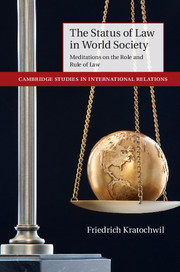Book contents
- Frontmatter
- Dedication
- Epigraph
- Contents
- Preface
- Introduction: images of law
- Meditation 1 Inter-disciplinarity, the epistemological ideal of incontrovertible foundations, and the problem of praxis
- Meditation 2 On the concept of law
- Meditation 3 On constitutions and fragmented orders
- Meditation 4 Of experts, helpers, and enthusiasts
- Meditation 5 The power of metaphors and narratives: systems, teleology, evolution, and the issue of the “global community”
- Meditation 6 Cosmopolitanism, publicity, and the emergence of a “global administrative law”
- Meditation 7 The politics of rights
- Meditation 8 The limits and burdens of rights
- Meditation 9 The bounds of (non)sense
- Index
- References
Meditation 8 - The limits and burdens of rights
Published online by Cambridge University Press: 05 June 2014
- Frontmatter
- Dedication
- Epigraph
- Contents
- Preface
- Introduction: images of law
- Meditation 1 Inter-disciplinarity, the epistemological ideal of incontrovertible foundations, and the problem of praxis
- Meditation 2 On the concept of law
- Meditation 3 On constitutions and fragmented orders
- Meditation 4 Of experts, helpers, and enthusiasts
- Meditation 5 The power of metaphors and narratives: systems, teleology, evolution, and the issue of the “global community”
- Meditation 6 Cosmopolitanism, publicity, and the emergence of a “global administrative law”
- Meditation 7 The politics of rights
- Meditation 8 The limits and burdens of rights
- Meditation 9 The bounds of (non)sense
- Index
- References
Summary
Introduction
The previous Meditation was concerned with the emergence of the human rights talk and its politics. By investigating its grammar and by showing its heterogeneous sources I tried to counteract the quasi-theological narrative within which this talk is frequently embedded. In addition, I intended to point to specific interactions between political processes and law that account for the hegemonic character of the rights talk in modernity and post-modernity. Not only are rights everywhere, policy problems, as well as general moral questions, are also increasingly phrased in terms of “the right to.” They are displacing former conceptions of the salus publica, of the police powers of the state, of civic or personal virtue, or even of duties that we owe to ourselves or to others. This leads not only to a certain impoverishment of the political and perhaps even moral discourse which Glennon and Gilligan have noted, but also as to some conceptual puzzles which Waldron addressed.
The rights talk is also responsible for the phenomenal explosion of rights, from animal rights to the right of receiving a “promotion” at work. There is apparently little concern with the embeddedness of such remedies in certain specific social structures and with the heuristic costs of a conceptual stretch, when the modern factory worker is taken as an a-temporal “universal” paradigm. But such an ideal type certainly does not sit well with that of self-employed professionals, who probably cannot even fathom what a right to promotion would entail. Similarly, resisting the tendency of assigning rights to animals has to do with the inaptness of protecting all things by rights. After all, “claiming” or “standing on one’s rights” is central to the notion “having rights” both in terms of agency, which is thereby constituted, but also in terms of the duties that are then assigned to others.
- Type
- Chapter
- Information
- The Status of Law in World SocietyMeditations on the Role and Rule of Law, pp. 230 - 260Publisher: Cambridge University PressPrint publication year: 2014



